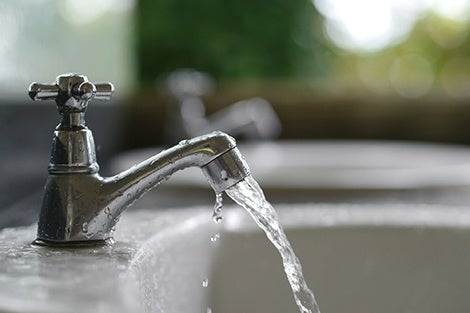July 25, 2017 – Nearly a third of U.S. adults are not hydrated enough, and poorer adults as well as Black and Hispanic adults are at higher risk for poor hydration than wealthier and white adults, according to a new study from Harvard T.H. Chan School of Public Health.
Lack of access to clean, safe drinking water—as highlighted by recent water crises in communities such as Flint, Michigan—may be one of the main reasons for the disparities, the authors suggested.
The study appeared online July 20, 2017 in the American Journal of Public Health.
“Because poor hydration status may negatively affect cognitive functioning, mood, and well-being, disparities in hydration status could lead to disparities in overall well-being and daily functioning,” said lead author Carolyn Brooks, a doctoral candidate in the Social and Behavioral Sciences and Nutrition Departments at the Harvard Chan School. “Furthermore, understanding how differences in tap water and other beverage intake contribute to those disparities provides public health practitioners with distinct strategies for action—supporting policy, environmental, and behavioral interventions that increase consumption of healthy and affordable beverages.”
Hydration is essential for maintaining proper physiological functioning, and extreme dehydration is associated with serious health problems that can require immediate attention. The Harvard Chan researchers looked at more mild levels of inadequate hydration, which can impair daily functioning and wellbeing with symptoms such as fatigue, irritability, reduced cognitive functioning, poorer physical performance, and headaches.
The researchers looked at data from 2009-2012 from more than 8,000 U.S. adults aged 20-74 who participated in the National Health and Nutrition Examination Survey, a study of the health of U.S. children and adults conducted each year by the U.S. Centers for Disease Control and Prevention. They used urine osmolality—a measure of how concentrated a person’s urine is—to determine whether or not participants were adequately hydrated. Then they looked at whether participants’ consumption of tap water and other drinks helped explain their hydration status—and whether differences in tap water consumption might explain the worse hydration status outcomes among Black, Hispanic, and low-income adults.
Non-Hispanic Blacks and Hispanics were 40% more likely to be inadequately hydrated compared with non-Hispanic White adults, the researchers found. People with lower incomes were 20% more likely to be inadequately hydrated compared to those with higher incomes. Tap water intake, which was lower among Blacks, Hispanics, and those with lower incomes, partially explained the racial/ethnic differences in hydration status.
“These findings highlight the importance of having access to healthy beverages for public health,” said senior author Erica Kenney, a research associate in the Department of Social and Behavioral Sciences at Harvard Chan School. “Recent events in Flint, Michigan and elsewhere have really brought to the forefront that there are social inequities in access to safe drinking water in the United States and in perceptions of water quality. While more research is needed, our study suggests that there are social inequities in hydration status—and ultimately wellbeing—that mirror these inequities in safe water access.”
Other Harvard Chan School authors of the study included Steven Gortmaker, professor of the practice of health sociology and Angie Cradock, senior research scientist and deputy director of the Harvard Prevention Research Center. Michael Long, assistant professor at the George Washington University Milken Institute School of Public Health, was also a co-author.
—Karen Feldscher
photo: iStock
